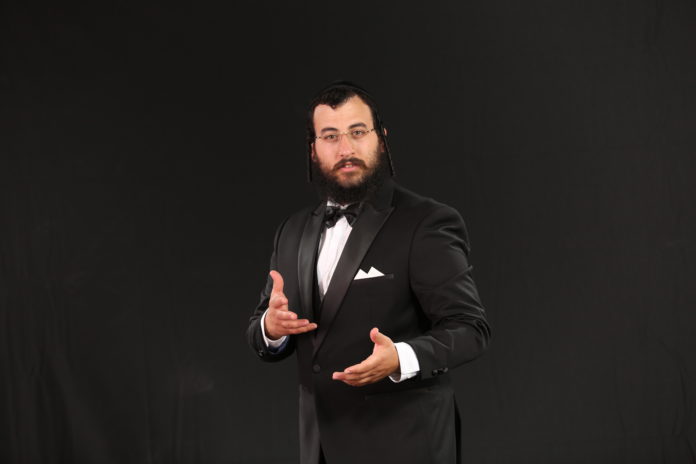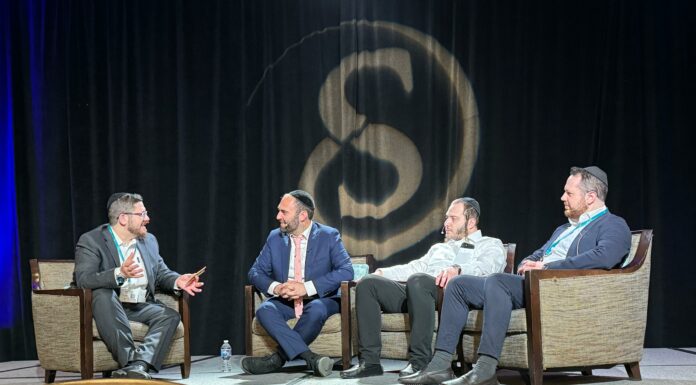Yisrael Nachman Tordjman, or Turgeman, as some prefer to pronounce the last name of this Tzfas-based singer, is probably one of the greatest stars on the Jewish musical scene today. But even though he’s a world-class performer of complex cantorial compositions, one doesn’t need to enjoy chazanus to love his music. That people who don’t even know how to pronounce the word are inspired by this gifted vocalist is a testament to his appeal.
After listening to his songs and watching his interactions with the audience, I shared my impressions of Yisrael Nachman with the great Jewish composer and songwriter Yossi Green, who recently wrote a song for him. I told Yossi that in my opinion, Yisrael Nachman is destined for superstardom. “The fact that you’re validating my opinion,” he replied, “is important to me, because it corroborates that I’m right about his talents.”
When I asked Yossi to articulate Yisrael Nachman’s skills, he said, “First of all, he has a sense of drama. One of the most interesting things about Avraham Fried is that he’s incredibly dramatic, which is something you see in the Yom Tov Ehrlich niggunim. Very few singers have that, but Avremel does and so does Yisrael Nachman. They both tell stories. When we worked on the song ‘Mi Ba’eish’ and we got to the words ‘mi baraash,’ I told him that I wanted to hear the ‘raash’ in the song. He gave it to me a second later. He also has a color in his voice that others don’t have, which is very exciting.
“Also, his taste in chazanus is highly developed. What he does to ‘Kol Nidrei’ is very special. Of course, it’s Yossele Rosenblatt’s, but every chazan gives it his own rendition. People ask me if it bothers me when I write a song and the singer changes a note here or there. I always say, ‘Pinkt farkert!’ I believe that a good composition has enough room for every singer to improvise and do it his own way.’”
What Yossi also found significant was Yisrael Nachman’s genuine love for Yiddishkeit, which he believes resonates with his growing fan base. “He’s young and heimish, which is very unique in this field, but he has a very serious shtele in Germany with a community that’s very modern. Despite the contrast, they really appreciate him, which is incredible. I used to think that no one knew who he was and that he was my discovery, but I see that people are getting to know him. In Israel, they’re hiring him for more and more gigs.
“It’s also nice to see how proud he is of his levush. He recently sang one of my songs with a German symphony orchestra. I looked at the audience and it was full of non-Jews, but he was standing in front of them with his curly peiyos. I find that when non-Jews see Yidden who are proud of their Yiddishkeit, they admire it. They don’t respect people who try to weasel out of it.
“Yisrael Nachman is a real ‘Tzfaser’ [resident of Tzfas]. He has a lichtiger disposition, and he’s in touch with his soul. He’s also a very nice person, very complimentary and appreciative. He was obviously very well-raised. He seems to have a nice family life as well. We worked together a few times, and I hope we’ll have lots of opportunities to do so in the future, im yirtzeh Hashem.”
In the Style
of Nachman
You have many fans, including the
great composer and maven Yossi Green.
The first time I sang on my own in front of a crowd was when I was in a choir that accompanied some chazanim onstage at a musical event in Krakow. While we were there, I started to sing the Shabbos zemiros as I had learned them from my father. The organizer of the event heard me and told the head of the choir that he wanted me to sing a solo. I sang the famous “Tanya” by Yossi Green. From there, my career began to take off.
I get the impression that you and
Yossi Green are mutual fans.
Around four years ago I asked someone to try to put me in touch with him, because I wanted him to write a song for me. This person told me that Yossi’s songs were very expensive, and it would also take him a long time because he’s so busy, so I decided to leave it alone. Two years later, I got an email from someone in America named Wagschal, who was producing a professional play for Chol Hamoed Pesach. The story included a chazan, and he said that after hearing my “Kol Nidrei,” he wanted me for the role. When I asked him who the musical producer was, he said Yossi Green, and that Yossi would be in touch. When he called me, he said, “Nachman, I heard your ‘Kol Nidrei’ a number of times, and I really want to write music for you.” That was a very special moment for me.
Which song did he write?
It’s called “Mi Ba’eish Umi Bamayim” because the story takes place in the midst of a war, and some of the soldiers walk into a shul on Rosh Hashanah while the chazan is singing “Unesaneh Tokef.” Unfortunately, the play never ended up happening because COVID hit and shut everything down. Last year, I told Yossi before Rosh Hashanah that after all the suffering everyone experienced it would be great if we could release this song. But it didn’t end up working out in time, so I ended up releasing it this year before Rosh Hashanah. Ever since he wrote that song for me we’ve been in close contact, even though we still haven’t met. I get the feeling that Yossi considers me a bridge in Jewish music between the previous generation and the next.
But your style of singing is that of the chazanus of yesteryear. You’re continuing the mesorah. You’re a chazan in the old-fashioned sense.
For me, learning the classic pieces isn’t just about the technical aspects, it’s also about connecting with them on a very deep level. But these days, even young secular people find that very inspiring. This past Shabbos I was in Modiin with a 30-member choir led by Yankele Rottner. It was pouring outside and the shul was packed. Whether it was because of the rain or the chazanus I’m not sure, but people didn’t want to leave. This morning I received a message from someone in the municipality, which is responsible for funding such events. She wrote, “I want you to know that you managed to bring chiloniim into the beit knesset, which is what is really important to us. The datiim don’t interest us in this regard. The main thing is the kiruv.”
The message was forwarded to me by the director of the municipality, who isn’t observant. “That was the whole point,” he wrote, “and I can tell you that you were successful.” It made me so happy, because whenever I get up to sing, regardless of whether it’s for a concert or tefillah, I say to Hashem, “Abba, help me be mekadeish sheim shamayim.”
How old are you?
I’m 28. I discovered chazanus when I was 18.
That’s very striking, because most young people don’t have any appreciation for it.
People say that the world of chazanus is constantly shrinking. They’re right, but in a certain sense they’re wrong as well. On the one hand, there are chazanim today who are hard to listen to. It’s not really coming from the heart, they’re more technical, and they stretch things out when people just want to go home and don’t have much patience. That’s why one of the most important things we are taught is how to size up your crowd as quickly as possible. It’s about being meurav b’daat im habriyos. A good chazan can figure out right away what the crowd is interested in. It takes me only about 20 seconds, and I know how to ensure that everyone—those who like chazanus and those who don’t—will be happy. It’s an important skill to have.
Around three weeks ago I had an appearance in Munich, 20 meters from the home of Hitler, yimach shemo. There were 600 people in the audience, 90% of whom weren’t Jewish. After the concert, a number of people came over to talk to me, including a Mrs. Knoblauch, who is one of the leaders of the Jewish community. Then there was a man who I assumed wasn’t Jewish until he said, “You make me proud to be a Jew.” I was a bit surprised, and I asked him what had affected him so much. He replied, “You sang a song that included the words ‘git Shabbos,’ and it touched me in a way I hadn’t felt in a long time.”
What do you think evoked that emotion?





















